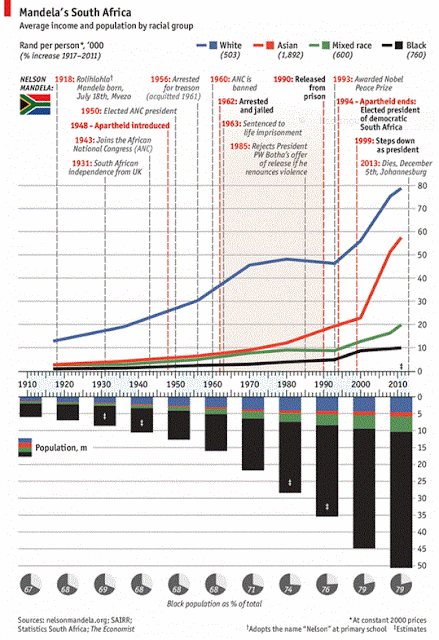Today we mourn the death of a remarkable man who transformed his country's political landscape and left a profound mark on the world.
Nelson Mandela was born into a South Africa increasingly divided along racial lines. The Natives Land Act of 1913 and subsequent government laws instituted mass segregation and oppression, ranging from residential and business segregation, "pass" laws that required nonwhites to carry identification papers, forbidden social contacts between those of European descent and others, segregated public facilities, and separate educational standards; to job restrictions for Blacks, curtailment of nonwhite labor unions, and denial of nonwhite participation in the national government. These laws became known as the Apartheid ("apartness" or "separateness") rule.
As discrimination intensified and the wage gap between South African Whites and Blacks grew larger, Black organizations such as the African National Congress (ANC) and the Pan-Africanist Congress (PAC) spearheaded the fight against Apartheid. The ANC and PAC were outlawed by the white South African government in 1959 and, denied legal avenues for political change, turned to sabotage and guerilla warfare. Their leaders, including Mandela as the head of the ANC, were branded as terrorists by the West and in 1964 several of them were sentenced to life imprisonment.
Following his release from prison in 1990, Mandela succeeded Oliver Tambo as president of the ANC, led the ANC in negotiations with the government over transition to a government elected by universal suffrage, and after his party swept into power in 1994, headed a government of national unity as South Africa's first Black president.
He will be remembered as a man who stood up for justice and civil and human rights in the face of enormous opposition, and worked to create a democratic and inclusive South Africa through forgiveness and reconciliation.
Regrettably, while his efforts helped bring about the end of legislated Apartheid, the social and economic legacy of decades of segregation and discrimination remains deeply entrenched: "Income growth improved substantially for all South Africans after his 1994 election victory, but sufficiently more so for whites, and the balance has been disproportionately weighted in their favour - and increasingly that of Asian South Africans - since he stepped down in 1999. Under its own majority rule, the lot of the ever-growing black population – today forming over three-quarters of the national total – has been notably poor. Misguided governance, low-quality education, skills shortages and massive unemployment levels of around 40% have left it more disadvantaged today than when Nelson Mandela was still behind bars. Black income has virtually flat-lined, betraying tremendous gulfs between the wealth of the different racial groups. Sadly, the nation Mandela leaves behind today remains one of the most unequal in the world."
Read more:
http://www.economist.com/blogs/graphicdetail/2013/12/daily-chart-6
About TeachingwithData.org
TeachingWithData.org is a partnership between the Inter-university Consortium for Political and Social Research (ICPSR) and the Social Science Data Analysis Network (SSDAN), both at the University of Michigan. The project is funded by NSF Award 0840642, George Alter (ICPSR), PI and William Frey (SSDAN), co-PI.
Translate
Search This Blog
Popular Posts
-
A study recently featured in the Journal of Comparative Economics examines income inequality in urban China. Capital income increased d...
-
A recent post on the Economist’s Graphic Detail blog includes a global map of cigarette smokers in 2010, as reported by the American Cance...
-
The month of March signaled the beginning of National Women’s History Month, as well as the annual Oscar Awards ceremony, which was held on...
-
According to the Washington Post, since 2009, the unemployment rate in the United States has dropped by 50% . The traditional...
-
If you’ve hit the point in the semester where your classes have fallen into routines and you’d like to spice things up a bit, this webinar i...






No comments :
Post a Comment